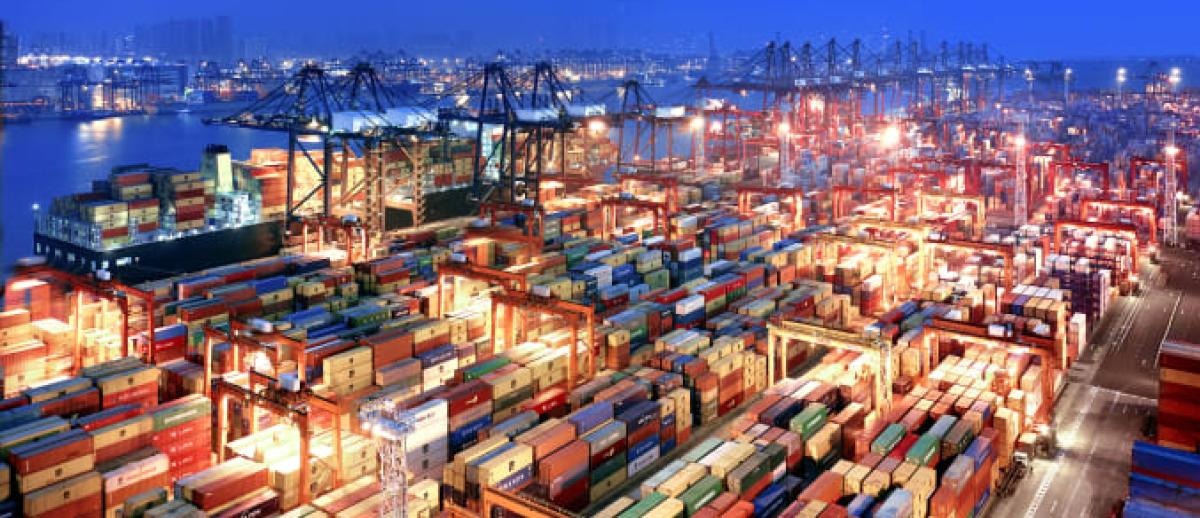Globalization at Its Limit? From Somewhere to Anywhere
archive


Globalization at Its Limit? From Somewhere to Anywhere
Roland Benedikter and Ingrid Kofler coined the term “Re-Globalization” to describe the present phase of re-partition and transition within the global system. For the coming years, and from the viewpoint of economics, the most likely options among Benedikter and Kofler’s proposed 5 R’s are, in my view, reforming and reframing globalization as we knew it.
Over the last several decades, the world has experienced a pronounced development of internationalization and globalization. More capital, more goods and services, and more people travel and move around the globe than ever before,1 in the process creating significant wealth that is most easily explained by the example of trading goods. Simply, globalization works through division of labor, creating rents that come from mainly three sources: 1) exchange of goods that cannot be produced domestically and thus expand national consumption and production opportunities; 2) exchange of goods that can be produced more efficiently abroad than domestically due either to comparative advantage or to increasing returns to scale and similar arguments related to size or intertemporal cost effects; and 3) exchange of goods that reflect consumer preferences for variety, and thus expand the choice set of consumers in trading countries (Krugman et al., 2018). While a significant level of integration of world markets already existed at the end of the 19th century, integration today is far more pronounced and deeper than ever before (Williamson and Aghion, 1998).
However, looking at the data there are signs we have reached a political limit. Obviously, the financial crises of the latter 2000s had a negative effect on economic integration. World trade collapsed by around 10% percent in 2009, but recovered quickly in 2010. Since then, world trade in goods has increased by 1-5% every year, despite a surge of protectionism in the West, becoming more apparent in 2016/2017 mainly in the USA. The year 2019, however, will be the first year in a very long time in which world trade levels contracted by more than 1% while world economic activity measured by gross domestic product still grew by about 3% (Bittschi et al., 2019). It is unusual under relatively peaceful political conditions to see such a contraction in times of world economic growth, without any crash on financial markets.
Three developments contribute to this contraction in world trade and to decelerating globalization. First, protectionism has become more fashionable among leading politicians around the world. This is most obvious in the USA, led by a strong movement around the current administration that erroneously thinks that the US is “exploited” by trading partners and that does not understand the basic 101-economics of a trade balance sheet. However, it would be far too easy to just blame the USA for this development. Both China and the European Union have become more protectionist, to different extents and for different reasons. Whether this is only a reaction to US policies or an independent development is a question without too much relevance for the economist analyst. Particularly in Europe, protectionist movements have tried to fight any trade agreements, even those—such as the Comprehensive Economic and Trade Agreement (CETA) between the European Union and Canada—which are innocuous in most respects and would not have triggered serious public discussion, say, a decade ago. Among those in Europe who are opposed to free trade deals, we have witnessed a handshake between the nationalistic far right that opposes such agreements out of a general distaste for international cooperation (seen as a reduction in national sovereignty), and the (far) left that mostly fears a loss of jobs, a reduction in legal standards for consumers, and negative environmental implications from increased transportation of goods. Together they are a sizeable minority in some European countries and team up with agricultural and industry lobbies that are afraid of increased competition when markets open up. So far, many of these movements were able to deceive consumers, making them believe that they act in their interest.2
Among those in Europe who are opposed to free trade deals, we have witnessed a handshake between the nationalistic far right... and the (far) left.
Arguments in connection with environmental conservation and climate change per se are the second reason that explains the surge in protectionism. International trade and the free movement of people are seen as a burden for the environment and an obstacle to reaching climate goals. In such discussions environmental costs are often not properly weighed against the benefits of globalization that go far beyond simple economic benefits. For instance, economic integration is empirically by far the best means for reducing the chance of violent conflict between jurisdictions. Obviously, on the cost side it is necessary to internalize negative externalities like, for example, transportation emissions, so it would be wise if international climate conferences focused on appropriate pricing of kerosene or diesel for ship engines. Climate protection through full-cost pricing and free trade should and can go hand in hand. However, opposing free trade arrangements such as the one between Mercosur and the European Union just because the president of Brazil allegedly does too little to protect the Amazonian forest is not only throwing the baby out with the bathwater, it seems a hypocritical use of the political power of the stronger trading partner. Again, this does not preclude linking trading arrangements with political goals ex ante, but it is hard to find a convincing rationale for doing it ex post facto.

Amazon rainforest fire, September 2019. (Source: AFP)
A third argument associated with technology helps to explain why the world might have reached a potential peak in terms of globalization. The process of digitalization allows us in certain industries—at least to some extent—to decouple the costs of production from labor costs. While we have experienced a wave of international outsourcing (especially from the USA and from Europe to Asia), we now see signs of in-sourcing (or: reshoring) again, that is, a relocation of production sites from Asia to Europe and the USA. This development has been engendered by a combination of reduced labor intensity in production through digitalization and rising labor costs in Asia as a consequence of economic growth in Asian countries.3

GM workers outside Lordstown, Ohio, plant in March 2019 as it closes after producing cars for 50 years. (Source: Getty Images)
Will the second decade of the new millennium become known in the history books of the future as the pinnacle of globalization? The answer to this question may depend on whether globalization has the capacity to become more inclusive than it has been hitherto. In fact, globalization, digitalization, and climate change have one thing in common: on average, they seem to benefit those who are well-educated, mobile, and flexible, whereas they seem to hurt those who are less educated and less mobile. The key to making globalization more inclusive is education. The problem is that education is often not seen as a responsibility on the national level, but rather the local level. Hence, to a certain extent local and national politics have to ensure that globalization can continue in the long run. In Europe, every citizen—university student or apprentice—should spend a year studying or working abroad. Politics has to make sure that the “Somewheres”—those who stay in place and tend to lose from the process of globalization—become “Anywheres” who have the skills, the knowledge, and the personalities to prosper in different environments irrespective of country or continent.
Otherwise, additional benefits from globalization will be lost, and societies will become even more polarized than they already are. We would be ill-advised to believe that the polarization between the Somewheres and the Anywheres could be mitigated through a system of transfers and social benefits for those who stand to lose from globalization and digitalization. Offering fair chances is a much better and a much more sustainable device than offering social benefits ex post facto. If societies are able to convey credible equal opportunities through education, globalization will continue and lead to further global integration and benefits for a huge number of people.
Will the second decade of the new millennium become known in the history books of the future as the pinnacle of globalization? The answer to this question may depend on whether globalization has the capacity to become more inclusive than it has been hitherto.
Globalization therefore needs both reforming and reframing. It needs reforms to focus more on its heterogeneous effects on different groups. The dividing lines are less and less between countries and more and more within countries. It needs reframing because the current emphasis on trade is too narrow and related migration is seen as mostly negative by locals. Such reframing has to take place on both the conceptual level (which aspects are or should be affected by globalization) and the practical level (what does data tell us about the effects of globalization). The outcome could be a positive notion and connotation of “re-globalization” meaning, in essence, “better globalization.”
Bittschi, B., Fortin, I., Grozea-Helmenstein, D., Hlouskova, J., Hofer, H., Koch, S., Kocher, M. , Kunst, R., Reiter, M., Sellner, R., Weyerstrass, K. (2019) "Prognose der österreichischen Wirtschaft 2019-2021: Allmähliche Konjunkturbelegung." Wirtschaftsprognose / Economic Forecast 110.
Krugman, P., Obstfeld, M., Melitz, M. (2018). International Economics: Theory and Policy, 11th edition, Pearson.
Williamson, J., Aghion, P. (1998). Growth, Inequality and Globalization: Theory, History, and Policy, Cambridge University Press.



